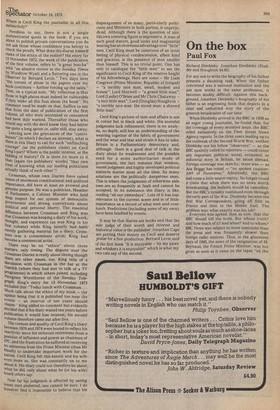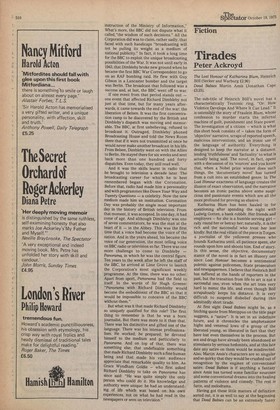On the box
Paul Fox
Richard Dimbleby Jonathan Dimbleby (Hodder and Stoughton £4.95) For any son to write the biography of his father presents a daunting task. When the father concerned was a national institution and the son now works in the same profession, it becomes doubly difficult. Against this background, Jonathan Dimbleby's biography of his father is an engrossing book that depicts in a clear and unhurried way the story of the greatest broadcaster of our time.
When Dimbleby arrived in the BBC in 1936 as an eager young journalist, he found that, for the coverage of every sensitive issue, the BBC relied exclusively on the Fleet Street News Agency reports. In the three years leading up to the outbreak of the Second World War, neither Dimbleby nor his fellow "observers" — as the BBC quaintly called its reporters — could cover any important political, social, economic or industrial story in Britain, let alone abroad. Foreign coverage was sketchy; there was — as Ma Briggs has noted — "no spoken counterpart of Panorama." Admittedly, the BBC had come a little nearer reality. No longer could it claim that when there was no news worth broadcasting, the bulletin would be cancelled. But the BBC's timidity continued even through the early part of the War. Dimbleby became the first War Correspondent, going off first to France and then to the Middle East. The problem was: what exactly was his iob? Everyone was agreed, then as now, that the BBC should tell the truth. But whose truth? And how much of it? And when? And to whom? BBC News was subject to more sanctions than the press and was frequently slower than foreign radio stations. Thus, in the gloomiest days of 1940, the news of the resignation of M. Reynaud, the French Prime Minister, was not given as soon as it came on the tapes "on the instruction of the Ministry of Information.," What's more, the BBC did not dispute what it called,"the wisdom of such decisions." All the Corporation did was to claim, rather sadly, that faced with such handicaps "broadcasting will not be pulling its weight as a medium of national publicity." In fact, it took a long time for the BBC to exploit the unique broadcasting possibilities of the War. It was not until early in 1943, that Dimbleby broke new ground when he became the first BBC War Correspondent to go on an RAF bombing raid. He flew with Guy Gibson in a Lancaster bomber and the target was Berlin. The broadcast that followed was a success and, at last, the BBC went off to war.
If one event from that period stands out — one event that affected Richard Dimbleby not just at that time, but for many years afterwards, it came towards the end of the war: the liberation of Belsen. It was the first concentration camp to be discovered by the British and Dimbleby's dispatch was moving and memorable. The BBC, at first unbelieving, refused to broadcast it. Outraged, Dimbleby phoned Broadcasting House and told the News Room there that if it were not transmitted at once he would never make another broadcast in his life. From Belsen, Dimbleby went on with the Allies to Berlin. He stayed there for six weeks and sent back more than one hundred and forty dispatches. Even today, they still read well.
And it was the skills learnt in radio that he brought to television a decade later. The broadcasting career for which he is best remembered began with the Coronation. Before that, radio had made him a personality andwith programmes like Down Your Way and Twenty Questions — a celebrity. Now the new medium made him an institution. Coronation Day was probably the single most important day in the history of British television. From that moment, it was accepted. In one day, it had come of age. And although Dimbleby was one of seven commentators, he was the man at the heart of it — in the Abbey. This was the first time that a voice had become the voice of the nation. And in the years ahead, his became the voice of our generation, the most telling voice on BBC radio or television so far. There was one more challenge to come to Dimbleby — Panorama, in which he was the central figure. Ten years to the week after he left the staff of the BBC, he arrived at Lime Grove to launch the Corporation's most significant weekly programme. At the time, there was no other. Apart from sport, Panorama had the field to itself. In the words of Sir Hugh Greene: "Panorama with Richard Dimbleby would become the embodiment of the BBC so that it would be impossible to conceive of the BBC without them."
But what was it that made Richard Dimbleby so uniquely qualified for this role? The first thing to remember is that he was a born journalist. But there was more to it than that. There was his distinctive and gifted use of the language. There was his intense professionalism. He worked; he prepared; he devoted himself to the medium and particularly to Panorama. And on top of that, there was something else; that undefinable something that made Richard Dimbleby such a fine human being and that made his vast audience appreciate that remarkable quality to him. As Grace Wyndham Goldie — who first asked Richard Dimbleby to take on Panorama has since said: "He was quite simply the only person who could do it. His knowledge and authority were unique: he had an understanding of life which was based on his own experiences, not on what he had read in the newspapers or seen on television."



































 Previous page
Previous page